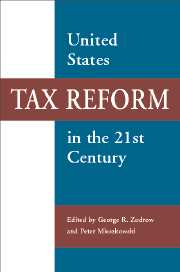Book contents
- Frontmatter
- Contents
- List of Contributors
- Preface
- 1 Introduction: The Fundamental Question in Fundamental Tax Reform
- 2 Behavioral Responses to a Consumption Tax
- 3 The Economic Impact of Fundamental Tax Reform
- 4 Capital Income Taxation in Tax Reform: Implications for Analysis of Distribution and Efficiency
- 5 International Aspects of Fundamental Tax Reform
- 6 Distributive Analysis of Fundamental Tax Reform
- 7 The Role of Administrative Issues in Tax Reform: Simplicity, Compliance, and Administration
- 8 Evaluating the National Retail Sales Tax from a VAT Perspective
- 9 Transitional Issues in the Implementation of a Flat Tax or a National Retail Sales Tax
- 10 Historical and Contemporary Debate on Consumption Taxes
- 11 The Politics and Ideology of Fundamental Tax Reform
- Bibliography
- Index
2 - Behavioral Responses to a Consumption Tax
Published online by Cambridge University Press: 23 October 2009
- Frontmatter
- Contents
- List of Contributors
- Preface
- 1 Introduction: The Fundamental Question in Fundamental Tax Reform
- 2 Behavioral Responses to a Consumption Tax
- 3 The Economic Impact of Fundamental Tax Reform
- 4 Capital Income Taxation in Tax Reform: Implications for Analysis of Distribution and Efficiency
- 5 International Aspects of Fundamental Tax Reform
- 6 Distributive Analysis of Fundamental Tax Reform
- 7 The Role of Administrative Issues in Tax Reform: Simplicity, Compliance, and Administration
- 8 Evaluating the National Retail Sales Tax from a VAT Perspective
- 9 Transitional Issues in the Implementation of a Flat Tax or a National Retail Sales Tax
- 10 Historical and Contemporary Debate on Consumption Taxes
- 11 The Politics and Ideology of Fundamental Tax Reform
- Bibliography
- Index
Summary
A shift from the current income tax system to a consumption tax would have potentially far-reaching implications for the economy, changing the incentives for savings and investment, for work effort, and for the allocation of investment and consumption. Relative prices would change, in some cases in a dramatic way. Most plans also envision a flatter (or even completely flat) rate structure, and some would dramatically change the point of collection of revenues.
In order to consider seriously such a radical change in the tax system, it is important to understand the behavioral responses to these new tax incentives. Despite much attention to this issue, there is little consensus on these effects. The lack of consensus is not for lack of studies; policy makers can consult a wide variety of studies of the effects of fundamental tax reform. The difficulty is the dramatic variations in projected effects among the studies.
This understanding of potential behavioral responses is complicated because of the variety of behavioral effects. For example, one of the rationales for shifting to a consumption tax is to increase savings. A consumption tax, by exempting resources devoted to savings and only taxing those resources, and their earnings, in the future when converted to consumption, is the equivalent of exempting the normal return to capital income from tax (see Hubbard, Chapter 4 in this volume). Such favorable treatment of capital income should increase savings, and, therefore future output and welfare. Output and welfare may also be increased with a more efficient allocation of resources.
- Type
- Chapter
- Information
- United States Tax Reform in the 21st Century , pp. 25 - 54Publisher: Cambridge University PressPrint publication year: 2002
- 2
- Cited by

